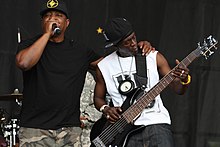
Back Politisk hiphop Danish Rap político Spanish هیپ هاپ سیاسی Persian Rap politique French היפ הופ פוליטי HE Rap politik HT Քաղաքական հիփ հոփ Armenian Political hip hop Italian Politieke hiphop Dutch Polityczny hip-hop Polish
This article has multiple issues. Please help improve it or discuss these issues on the talk page. (Learn how and when to remove these messages)
|
| Political hip hop | |
|---|---|
 | |
| Stylistic origins | |
| Cultural origins | 1980s |
| Derivative forms | Conscious hip hop |
| Other topics | |
Political hip hop (also known as political rap) is a subgenre of hip hop music that emerged in the 1980s as a form of political expression and activism. It typically addresses sociopolitical issues through lyrics, aiming to inspire action, promote social change, or convey specific political viewpoints. The genre draws inspiration from earlier politically conscious artists, such as The Last Poets and Gil Scott-Heron, as well as movements like the Black Power movement and the Black Panther Party from the 1960s and 1970s.[1]
Notable early political hip hop artists include KRS-One and Boogie Down Productions, as well as Public Enemy, both of whom were influential in establishing political rap in the late 1980s with albums that addressed social and political concerns. Other artists, often labeled as part of the "conscious rap" movement, such as X-Clan, Poor Righteous Teachers, Paris, and Disposable Heroes of Hiphoprisy, followed in subsequent years, expanding the genre's focus on political messages.[2][3][4]
The genre has long been intertwined with political activism, providing a platform for artists to address issues such as police brutality, racism, corruption, and economic inequality. Some well-known examples of politically charged hip hop songs include: "The Message" (1982), "Fight the Power" (1988), "Fuck tha Police" (1988), "Changes" (1998), "Mosh" (2004), "Minority Report" (2006), "The Blacker the Berry" (2015), "Snow on Tha Bluff" (2020), and "The Bigger Picture" (2020).[5][6]
- ^ Review-Rap-and-Politics Ucpress.edu Retrieved 10 June 2024
- ^ Political Rap, 2024, retrieved February 4, 2024
- ^ "Rhythm, rhyme and reason: hip hop expressivity as political discourse",
- ^ "Political Rap: The Music of Oppositional Resistance",(subscription required)
- ^ Perry, Imani (November 30, 2004). Prophets of the Hood. Duke University Press. doi:10.2307/j.ctv31jm90p. ISBN 978-0-8223-8615-5.
- ^ 100 Essential Political & Conscious Hip Hop Albums, 2021, retrieved February 2, 2024